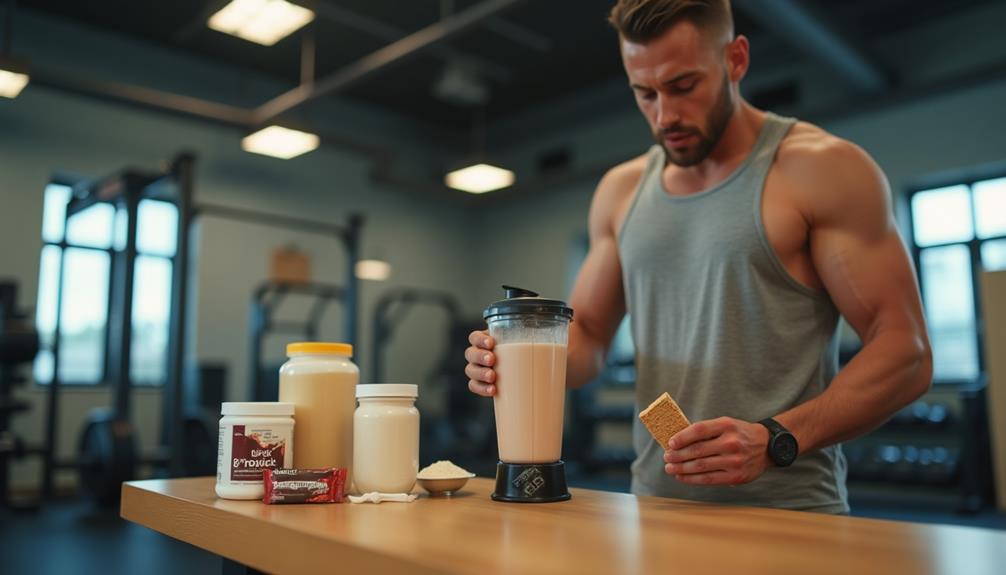To speed up muscle recovery, follow a step-by-step protein supplementation guide. First, understand protein's role; it's essential for post-workout recovery. Next, choose the right supplement—whey for quick recovery, or plant-based if you prefer vegan options. Then, determine your protein needs based on your weight and activity level, aiming for 0.7 to 1 gram per pound. Timing matters; consume protein right after your workout and before bed for best results. Pair protein with carbohydrates for the top recovery. Finally, monitor your progress to adjust your intake as needed. There's much more to explore to refine your approach.
Core Insights
- Determine your protein needs by calculating 0.7 to 1 gram per pound of body weight based on your activity level.
- Choose the right type of protein supplement, like whey for quick recovery or casein for overnight muscle repair.
- Timing is crucial: consume protein immediately post-workout and consider a protein-rich snack before bed for sustained recovery.
- Combine protein with carbohydrates in a 3:1 ratio to optimize glycogen replenishment and muscle repair.
- Monitor your progress with a food diary and workout logs to adjust protein intake and improve recovery strategies.
Understanding Protein's Role

Timing also matters. Consuming protein shortly after your workout helps maximize recovery. Protein shakes can be an effective way to quickly deliver essential nutrients to your muscles post-exercise. When selecting a protein supplement, consider factors like protein content, amino acid profile, and dietary restrictions. Aim for a balanced intake, incorporating protein into meals and snacks throughout the day. This strategy not only aids muscle recovery but also supports overall health. By understanding protein's role, you can enhance your recovery process and improve your performance in future workouts.
Types of Protein Supplements

| Type | Source | Best For |
|---|---|---|
| Whey Protein | Dairy | Quick recovery |
| Casein Protein | Dairy | Overnight muscle repair |
| Plant-Based Protein | Plants | Vegan athletes |
Whey protein is fast-acting, making it ideal for post-workout recovery. Casein, on the other hand, digests slowly, providing a steady release of amino acids overnight. If you prefer plant-based options, there are plenty of blends available to meet your dietary needs. Choose wisely to support your muscle recovery goals!
Determining Your Protein Needs

To effectively support your muscle recovery, you need to determine how much protein is right for you. Start by considering your body weight and activity level. A common guideline is to aim for 0.7 to 1 gram of protein per pound of body weight for those engaged in regular exercise. While protein supplements can be beneficial, natural testosterone boosters may also help support muscle recovery and growth. These boosters often contain ingredients like Ashwagandha and Tongkat Ali, which can enhance physical performance.
For example, if you weigh 150 pounds, you should target between 105 and 150 grams of protein daily.
Next, think about your specific goals. If you're aiming to build muscle, you might want to lean toward the higher end of that range. Additionally, keep in mind the protein source—whole foods often provide other essential nutrients.
Best Timing for Supplementation

Finding the best moments for protein supplementation can greatly enhance your muscle recovery. Timing your intake is essential, as it helps your muscles rebuild and recover more effectively. Combining protein with fast-acting carbohydrates can further optimize recovery by quickly replenishing glycogen stores. Here are three key times to ponder:
- Post-Workout: Consuming protein within 30 minutes after your workout can kickstart muscle repair. This is often referred to as the "anabolic window."
- Before Bed: Taking protein before sleep can provide your body with a steady supply of amino acids throughout the night, which supports overnight recovery.
- Between Meals: Including protein shakes or snacks between meals can help maintain muscle protein synthesis, especially if you have long gaps between meals.
Combining Protein With Other Nutrients

Maximizing muscle recovery goes beyond just protein timing; it also involves combining protein with other nutrients for greatest results. When you consume protein, pairing it with carbohydrates helps replenish glycogen stores, which is essential after intense workouts. Aim for a ratio of 3:1 carbohydrates to protein for best recovery.
Moreover, don't forget healthy fats. Including sources like avocados or nuts can enhance nutrient absorption and support overall recovery.
Adding vitamins and minerals, particularly antioxidants from fruits and vegetables, can further combat exercise-induced inflammation.
Monitoring Your Progress
As you embark on your muscle recovery journey, monitoring your progress is vital for understanding what works best for your body. Keeping track of your recovery can help you make informed adjustments to your protein supplementation and overall routine. Here are three key areas to focus on:
- Track Your Workouts: Note the intensity, duration, and type of exercises you perform. This helps you see how your body responds to different training stimuli.
- Monitor Recovery Times: Pay attention to how long it takes for soreness to subside. Shorter recovery times may indicate effective protein supplementation.
- Assess Nutritional Intake: Keep a food diary to make sure you're hitting your protein goals and other nutrient targets daily.
Common Mistakes to Avoid

Many people make common mistakes when it comes to protein supplementation for muscle recovery. First, they often underestimate their protein needs. It is crucial to calculate your requirements based on your activity level and goals. Next, timing matters. Many skip post-workout protein intake, missing the recovery window. Finally, don't rely solely on supplements; whole foods should be your primary source. Additionally, some choose low-quality protein powders that may contain fillers or additives. Always read labels carefully. In conclusion, be cautious of over-supplementation. Too much protein can strain your kidneys and lead to unnecessary weight gain. By avoiding these pitfalls, you'll enhance your recovery and optimize your results effectively. Remember, smart supplementation complements a balanced diet, not replaces it.
Frequently Asked Questions
Can I Rely Solely on Protein Supplements for Muscle Recovery?
You can't rely solely on protein supplements for muscle recovery. Whole foods provide essential nutrients that supplements might lack. A balanced diet with a variety of proteins will support your recovery and overall health better.
Are There Any Side Effects to Long-Term Protein Supplement Use?
Using protein supplements is like riding a fine-tuned bike; it can be smooth, but over time, you might face side effects. Digestive issues, kidney strain, or nutrient imbalances can arise if you overdo it.
Do Protein Supplements Expire, and How Should I Store Them?
Yes, protein supplements can expire. To keep them fresh, store them in a cool, dry place, away from sunlight. Always check the expiration date on the packaging before using it to guarantee safety.
Can I Take Protein Supplements if I'm Lactose Intolerant?
Taking protein supplements with lactose intolerance can be like finding your way through a maze. You can opt for lactose-free protein powders or plant-based options, which allow you to power your workouts without discomfort. Just check labels to avoid hidden lactose!
How Do I Choose a Reputable Protein Supplement Brand?
To choose a reputable protein supplement brand, research customer reviews, check for third-party testing, and look for transparent ingredient lists. It's important to confirm the brand aligns with your dietary needs and fitness goals.

